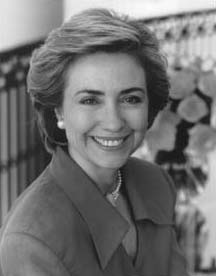天王盖地虎
天天读书,day day up!NEW YORK - Democratic Sen. Hillary Rodham Clinton embarked on a widely anticipated campaign for the White House on Saturday, a former first lady intent on becoming the first female president. "I'm in and I'm in to win," she said on her Web site.
Clinton's announcement, days after Sen. Barack Obama (news, bio, voting record) shook up the contest race with his bid to become the first black president, establishes the most diverse political field ever.
Clinton is considered the front-runner, with Obama and 2004 vice presidential nominee John Edwards top contenders. New Mexico Gov. Bill Richardson, who would be the first Hispanic president, intends to announce his plans on Sunday.
"You know after six years of  George Bush, it is time to renew the promise of America," Clinton says in a videotaped message in which she invites voters to begin a dialogue with her on the major issues — health care, Social Security and Medicare, and the war in Iraq.
George Bush, it is time to renew the promise of America," Clinton says in a videotaped message in which she invites voters to begin a dialogue with her on the major issues — health care, Social Security and Medicare, and the war in Iraq.
"I'm not just starting a campaign, though, I'm beginning a conversation with you, with America," she said. "Let's talk. Let's chat. The conversation in Washington has been just a little one-sided lately, don't you think?"
Clinton, who was re-elected to a second term last November, said she will spend the next two years "doing everything in my power to limit the damage George W. Bush can do. But only a new president will be able to undo Bush's mistakes and restore our hope and optimism."
In a defiant statement — and a nod to questions about her electability — Clinton said: "I have never been afraid to stand up for what I believe in or to face down the Republican machine. After nearly $70 million spent against my campaigns in New York and two landslide wins, I can say I know how Washington Republicans think, how they operate, and how to beat them."
With millions in the bank, a vast network of supporters and top status in nearly every poll of Democratic contenders, Clinton is undertaking the most viable effort by a female candidate to capture the White House.
She is the first presidential spouse to pursue the office; her husband, Bill, served two terms in the White House from 1993-2001.
The announcement was the latest step in a remarkable political and personal journey for the 59-year-old Clinton — from Arkansas lawyer to first lady to New York senator to front-runner for the Democratic nomination.
A polarizing figure since she burst onto the national scene during her husband's first presidential campaign, Clinton engenders strong opinions among voters, who either revere or revile her but rarely are ambivalent.
She often is compared to her husband and found lacking in his natural charisma. Others have criticized her for being overly cautious and calculating when so many voters say they crave authenticity.
Many Democrats, eager to reclaim the White House after eight years of President Bush, fret that she carries too much baggage from her husband's scandal-plagued presidency to win a general election. Among many voters, she is best known for her disastrous attempt in 1993 to overhaul the nation's health care system and for standing by her husband after his marital infidelity.
Clinton's allies counter by citing her strengths — intelligence, depth of experience, work ethic and immense command of policy detail. Advisers argue those skills, plus her popularity among women and younger voters, position her strongly as both a primary and general election candidate.
In her first run for the Senate from New York in 2000 — a state where she had never lived and where she was branded a carpetbagger by many — Clinton won a landslide victory. Through dogged campaigning — including a "listening tour" of the state's 62 counties — Clinton was able to convince voters even in the conservative upstate region that she would represent them effectively in Washington.
Clinton's 2002 vote authorizing military force in Iraq has become a significant political challenge. It angered activists who want her to repudiate her vote and aggressively seek to block Bush's proposed troop increase.
She has toughened her criticism of the conduct of the war and Bush's handling of the conflict, and she recently called for capping troop levels in Iraq at around 140,000. She has rejected calls from liberal groups and Edwards to cut off funds for Bush's planned increase in U.S. troops.




